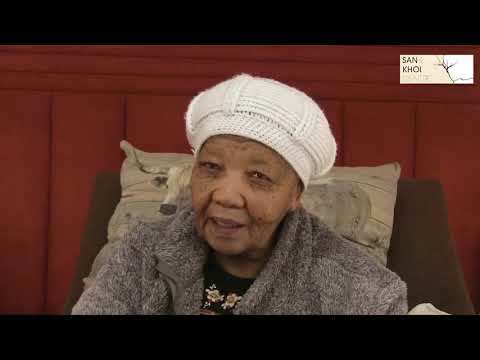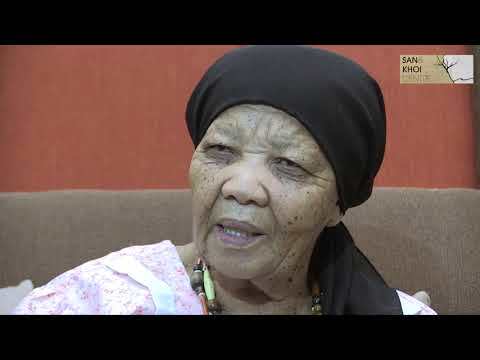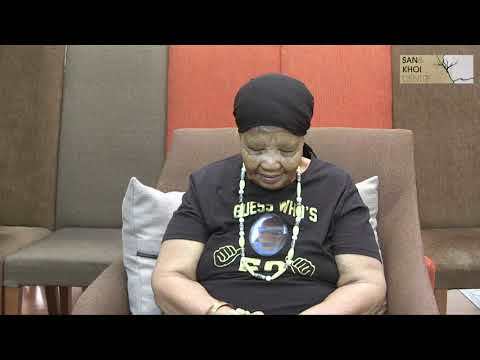The Nǀuu Language
Nǀuu is an endangered Southern African language that belongs to the Tuu language family. Today, there is only one fluent Nǀuu speaker: Katrina Esau. Katrina used to speak Nǀuu as a child but was then forbidden to speak her language and started using Afrikaans instead. Despite decades of not being able to use her language in everyday communication, she has worked hard to ensure its survival. This has been done through:
- Her school ǂAqe ǁX’oqe – meaning “Gaze at the Stars” – is where Katrina Esau, along with her granddaughter Claudia Snyman, has been teaching the language to young children.
- Writing the first children’s book in Nǀuu. !Qhoi nǀa Tjhoi (Tortoise and Ostrich) is a folk tale that was published in 2021. A review of the book can be found here: https://www.puku.co.za/books/qhoi-na-tjhoi-skilpad-en-volstruis-tortoise-and-ostrich/)
- Working with researchers to produce educational materials for her school, such as the 160-page Nǀuu-Afrikaans-English reader (freely available on Open UCT and this site).
Capturing Katrina Esau's life story in her own words, including her contribution to the survival of Nǀuu, was a vital part of the San & Khoi Digital Archive project. The life story of Katrina Esau, also known as Ouma Katrina, is available within the Archive in a three-part interview series.
Literature related to N|uu
-
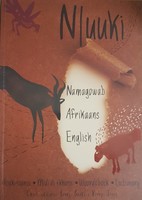
N|uuki, Namagowab, Afrikaans, English : ‡Xoaki‡xanisi, Mîdi di ‡Khanis, Woordeboek, Dictionary
This dictionary features two dialects of the N|uu language (Eastern and Western), as well as Nama, Afrikaans and South African English. This dictionary was not simply translated in standard varieties of Nama and Afrikaans, but was based on fieldwork conducted with speakers of these languages living in previously N|uu-speaking areas, i.e., South African Nama and 'Onse Afrikaans'. These languages and dialects show evidence of their influence on one another over time. -

Working in a Community : Case study: N/uu / N//ng
The "Case study: N/uu / N//ng" is a chapter in "Language Endangerment" edited by David Bradley and Maya Bradley. The book address the topic language endangerment through the lens of the disastrous consequence of reducing the variety of human knowledge and thought. It shows why it matters, why and how it happens, and what communities and scholars can do about it. The "Case study: N/uu / N//ng" is the book's third chapter and focusses on the #Komani people and their N!uu language which is close to extinction. Publisher Summary: Ethical research is not just a moral obligation, inappropriate behaviour is unacceptable. It can have bad consequences for a community and for later researchers; no one welcomes the eleventh nerd. Communities and individuals within them have priorities, and they usually do not include spending time with an outsider whose future intentions and use of the material collected are unknown. They often suspect that researchers wish to benefit financially from what is collected; and in truth nearly all researchers do wish to benefit, at least in terms of advancing their academic discipline and their own career. It is wise to have a truthful and understandable reason why you want to do your research in a particular place which you can explain to people. -

Casting a wider net over N||ng
N||ng is a moribund language complex that is a member of the Tuu family and used to be spoken widely across the southern portion of the Kalahari in the north of South Africa. While its modern linguistic remnants have been studied intensively, there are nevertheless many gaps in our knowledge about Nññng. This article surveys the older records that began to be collected in the second half of the nineteenth century, arguing that these can inform our modern analysis of the linguistic and nonlinguistic data and complement our overall perception of this extinct ethnolinguistic group and its wider geographical and historical context. -

Writing for speaking: The N/uu orthography
This chapter describes the "Writing for Speaking" project which aims to establish a shallow orthography that allows students who are non-native speakers of NIuu to read and pronounce new NIuu words, even those they have never heard before. -

The musical practices of the /?Auni and #Khomani Bushmen
Unvailable - can be determined when item is in hand -
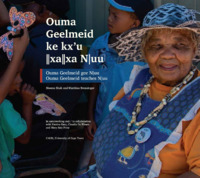
Ouma Geelmeid ke kx’u //xa//xa N/uu
Three sisters living near Upington in the Northern Cape province of South Africa are the last fluent speakers of Nǀuu. Linguists from the Centre for African Language Diversity (CALDi) at UCT produced an illustrated 160 page trilingual Nǀuu-Afrikaans-English reader in collaboration with community members to support revitalisation efforts of this highly endangered language. The hard copies of the reader are used in the Nǀuu language classes conducted by Ouma Geelmeid, the youngest of the three Nǀuu-speaking sisters. The reader features twelve thematic areas with phrases and sentences derived from everyday conversations, as well as games, prayers and songs taught by Ouma Geelmeid. Core cultural terms and basic vocabulary used in the Nǀuu language classes have been compiled in Nǀuu-Afrikaans-English and Afrikaans-Nǀuu-English glossaries. In addition, new Nǀuu language data is available to a wider audience, both academics and other interested parties, through the electronic online copy of the reader. This language data will be of particular interest to scholars working in a number of subfields of linguistics, including typology, historical linguistics and language contact studies.


